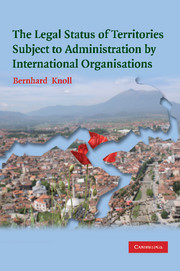Description
The Legal Status of Territories Subject to Administration by International Organisations
Author: Knoll Bernhard
An examination of the international community's practice of administering territories in post-conflict environments.
Language: English
Subject for The Legal Status of Territories Subject to...:
Approximative price 53.50 €
In Print (Delivery period: 14 days).
Add to cart
The Legal Status of Territories Subject to Administration by International Organisations
Publication date: 03-2012
Support: Print on demand
Publication date: 03-2012
Support: Print on demand
Approximative price 143.25 €
Subject to availability at the publisher.
Add to cart
The legal status of territories subject to administration by international organisations
Publication date: 06-2008
554 p. · 15.7x23.4 cm
Publication date: 06-2008
554 p. · 15.7x23.4 cm
Description
/li>Contents
/li>
The international community's practice of administering territories in post-conflict environments has raised important legal questions. Using Kosovo as a case study, Bernhard Knoll analyses the identity of the administrating UN organ, the ways in which the territories under consideration have acquired partial subjectivity in international law and the nature of legal obligations in the fiduciary exercise of transitional administration developed within the League of Nations' Mandate and the UN Trusteeship systems. Knoll discusses Kosovo's internal political and constitutional order and notes the absence of some of the characteristics normally found in liberal democracies, before proposing that the UN consolidates accountability guidelines related to the protection of human rights and the development of democratic standards should it engage in the transitional administration of territory.
Introduction; 1. Creation of internationalised territories; 2. Fiduciary administration: mandates, trust and the transitory sovereignty vacuum; 3. Self-determination and the personality of internationalised territories; 4. 'The King's Two Bodies': the dual functions of international administrations; 5. Extent of UN-authority in Kosovo and the problem of an open-ended institution-building mandate; 6. The status process; 7. An anomalous legitimacy cycle; 8. Properties of a transitory legal order; 9. Concluding appraisal.
© 2024 LAVOISIER S.A.S.




